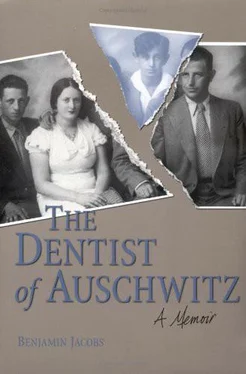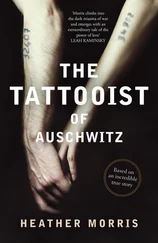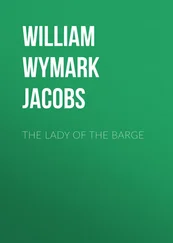In the beginning our camp was big news in the area. On Sunday the peasants would stroll by to find out who we were and why we were there. Although this region was known for its intense dislike of Jews, the local people, hearing that our identity was our only crime, showed genuine outrage. When an SS man saw some peasants at the fence, he admonished them to leave at once and never come back.
It was unusually warm for the middle of May. On Monday, our first workday, the bells rang at 4:00 A.M. It was dark when we assembled in the yard. The Kommandant from the Stadium camp and Dr. Neumann were in the center, surrounded by several SS men and a few of our policemen. I hoped that, as Papa had predicted, by now Neumann had forgotten about me. He did not, however, and after four hundred inmates, including my father and me, were separated from the rest, I suddenly heard, “Dentist, report to Dr. Neumann.”
An electric shock went through me. I didn’t know what to do. I feared to respond, and at the same time I also feared not to. Every second seemed like an hour. When I was called again, I still hesitated. “You have no choice,” Papa said. “You have to go.”
I made my way through the line, then ran forward, stopped, and clicked my heels two meters in front of him. “Dr. Neumann, Bronek Jakubowicz reports to you as ordered,” I said brightly.
He scanned me from top to bottom and then motioned me to his side. “Wait here,” he said.
I turned and found myself standing in a row with the SS and all the Nazi dignitaries. When I raised my eyes, a thousand fellow inmates looked at me, puzzled about why I was called there. I wanted to be with them. This was not my place. I had not chosen to be here. The remaining men were soon arranged in groups. Then Neumann pointed at the first four hundred and said to me, “Dentist, you’ll be their Kolonnenführer.” Thereupon he chose a Kolonnenführer for each group.
As we were led out, I saw many men wearing black, the color of the Gestapo, waiting for us at the gate. Dr. Neumann handed one of them a list of our names, and they took charge of us, ordering us to march out. On the road they began to prod us to walk in military rhythm. “Eins, zwei, drei, vier,” they repeated.
I left last and walked in the last row, without any idea what they expected of me. It was shortly before daylight, and I could see that despite the color of their uniforms, our commanders were neither Gestapo nor SS. Their coats lacked the Gestapo insignias and had no lapels. Their faces looked modest and unassuming. That made me curious about who they were.
The man in the black uniform who walked behind me carried a briefcase. I dropped back a bit and walked beside him. I wanted to say something, to begin to talk to him, but my words got stuck in my mouth. He hardly looked at me. I saw a weathered sign on a post, indicating that the road led toward Poznan. Finally I dared to ask him whether we were going to Poznan. A few agonizing moments passed, and he didn’t answer me. I was about to repeat my question when he spoke up. “We were advised not to fraternize with our prisoners.” Then after a while he added, “We are going to the Hoch und Tiefbaugesellschaft, to Brodzice.” Though he spoke German, I was sure that he wasn’t a German. I guessed that he was either a Volksdeutscher or a Pole.
“What is Hoch und Tiefbaugesellschaft?” I asked him, to keep the conversation going.
“They are building a railroad here,” he answered. After that our conversation took a more normal course. We still had an hour to march, he said, meaning that we would have a four-hour walk to and from work. As we left the main road, the sun began to clear away the morning haze. We then marched around a crescent lake, our shoes pounding and raising clouds of dust. Soon barracks became visible. “This is it,” the man said, pointing at them.
The first building was clearly for offices. The second looked like a kitchen and hall, and the third had picks, shovels, and wheelbarrows in front. This was the toolshed. One guard insisted that we approach the workplace respectably. “One, two, three, four, left,” he prompted. But he had to settle for the sound of tra-tra and ta-ta.
The guard I had talked with seemed to be in command. He handed some papers to the guard at the gate, who scanned them briefly and then asked the first, in Polish, how many we were. “Four hundred seven,” he squeezed out.
Then the second guard turned and asked the people around him, only this time in German, how many inmates they each needed. “Fifty,” “forty,” “thirty-five,” they answered.
He assigned them as many of us as they asked for, and each led a group away from the yard. Twenty of us, I among them, remained standing. To our left I saw a couple of cauldrons resting on a hearth. A woman about thirty years old was standing at the kitchen door. “Mr. Witczak, don’t forget, I need three men,” she called.
He pointed at the nearest three and told her to take them. Then she reminded him that she needed two more people to fetch water for her. He pointed at me and the man next to me and grunted, “You two work with Stasia.” And with that he turned and led away the remaining inmates.
The woman Stasia equipped her three kitchen helpers with knives and buckets of potatoes. Then she handed the two of us four pails. “Take these,” she said in a friendly voice. Pointing in the direction of a forest, she continued, “You’ll find a spring in these woods. Follow this road, and you’ll come to a small path.” She was at a loss to explain the trail further, so she signaled the guard. “What is your name, mister?”
“Tadeusz, but everyone calls me Tadek,” he said.
“Tadek, can you show them the spring?” He was also puzzled. Stasia pointed out a few markers, but he shook his head. Stasia, with good intentions, gave us two shoulder-carriers. “Here, they will make it easier.”
By this time the three potato peelers were hard at work. I saw how clumsily David Moszkowicz, a Jewish elder from Dobra and a confidant of Mayor Muszynski’s, handled the potatoes. This was, no doubt, a first for him, and every so often the knife slipped out of his hand. This didn’t escape Stasia. She took the potato and showed him her skills, how to roll it around the knife.
With our pails dangling from the chains, we followed our guard, Tadek. The man chosen to go with me was taller than I, and I had to take three steps for each two of his to keep up with him. Indifferent, hardly raising his eyes, he walked ahead of me. I asked him what his name was. “Marek,” he answered. Marek, I judged, was about thirty-five. He had the intelligent look of a city lawyer. Seeing him in his well-tailored gray trousers, herringbone jacket, and red tie, without the water pails, one would think he was on the way to court. His kind face drew me to him. I liked him from the first moment on.
As the pails bounced at our knees, we silently followed Tadek’s instructions. The smell of freshly cut grass tickled my senses. In many homes in rural Poland, water was supplied this way, by professional water carriers. Their carrying devices were made from logs and designed to contour to the shoulders. The length of the chains could be adjusted by knotting them in the middle. To us, however, the carriers were so uncomfortable that after the first try, we preferred to carry the pails in our hands. The trauma of the last three days had had a deeply dehumanizing effect on us. I felt all the more trapped.
The thick brush in the inner forest slowed us down. The path led us over bumps covered with slippery moss. Rotted trees and roots were everywhere we stepped. Finally we had to jump over a small stream, and then we found the spring. The spring water was pristine and cold and seemed to be bubbling out of the earth. Mosquitoes and other little insects swirled in a screen of dew that hung over the water. The look of the water invited us to sample it, and it was pure and delightfully refreshing. Because of the spring’s shallow basin, we took some time to fill the pails. I asked the guard, speaking Polish, if he had been here before. “No,” he said.
Читать дальше












